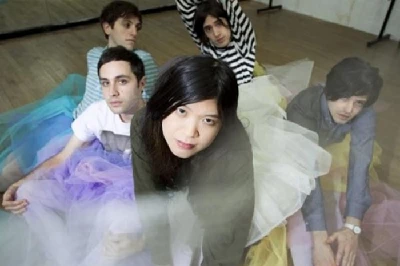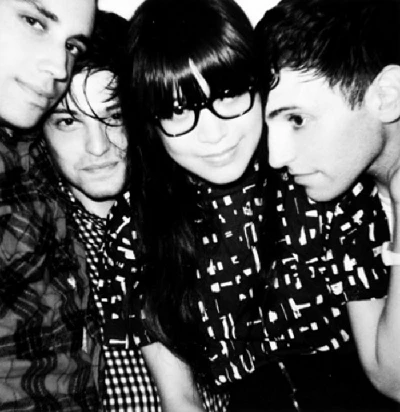published: 18 /
5 /
2011

New York-based indie pop band the Pains of Being Pure at Heart's vocalist and songwriter Kip Berman speaks to Dominic Simpson about 'Belong', his groundbreaking group's second album
Article
In the space of little more than four years, the Pains of Being Pure at Heart have risen from cult indie-pop act to major league contenders. Their first, self-titled album, released on Fortuna Pop (a label that they’ve elected to stay with through thick and thin in the UK), remains a classic and has already cemented its status among indie-pop fans and record store clerks equally. Recalling the very best moments of Edinburgh’s Shop Assistants, My Bloody Valentine’s pre-‘Isn’t Anything’ releases, the feedback-laced pop of the Jesus & Mary Chain’s ‘Psychocandy’, and countless C86 bands, it’s one of the very best of the indiepop genre, and already sounds timeless; its songs could have been released at any point in the last 25 years and would have stood the test of time. It’s one of those albums that makes you feel about sixteen again.
Not content to ride on the coattails of their debut, the first indication that the band’s sound was shifting was with the ‘Higher Than the Stars’ EP. Both the title track and the memorable ‘Falling Over’ repositioned their sound slightly, recalling Orange Juice, mid-period New Order, and the Field Mice more than any proponent of hazy guitars and fuzz-pop (though elsewhere on the EP the first album’s punky aesthetic was revisited, just in case we’d forgotten what their original sound was about).
The cleaner, clearer production on those two tracks foreshadowed the sound of their sophomore album, ‘Belong’, recorded with 90's alternative rock megaproducers Flood and Alan Moulder – a bold step into the mainstream (or near enough to it). It’s fair to say that the pedigree of those two producers’ clients – huge stadium-filling acts such as U2, Smashing Pumpkins, Nine Inch Nails, the Killers, et al. – remains a long way off from, for example, the Pastels first album, Talulah Gosh, and the Poo Sticks, never mind We’ve Got A Fuzzbox and We Intend to Use It. It shows, too, with much of the big 90s alt-rock sound of 'Belong'. The likes of single ‘Heart In Your Heartbreak’ has Berman’s trademark whispery voice and Peggy Wang-East’s synths high up in the mix. Then again, ‘Too Tough’, a gorgeous track near the album’s end, shows that they haven’t forgotten their roots. So what’s the band’s own take on their progression from the first album to the new one?
“Well, we’ve always tried to use the same ideas to write songs the best we can and record them the best we can,” frontman Kip Berman says over a transatlantic line from New York. “Whatever the fidelity might have been on the first record, it was an experience of us trying to use the resources and the chances we had to make that first record…but at the end of the day, it’s not like we set out to make a lo-fi record the first time; then we’re like, ‘Well, now we want a hi-fi record’ [with the new album]. The issue of fidelity and production were almost accidental in terms of the overall goals of trying to record our music the best we can and trying to make it sound the best we can.”
Relaxed and jovial, Berman is insistent that the choice of such big-name producers, combined with the increasing popularity of the band, has in no way led to increased pressures on the band – a fate that has befallen other acts facing a similar situation.
“We were really lucky in that we finished recording and mixing our first album in December 2008 and it wasn’t being released until February 2009, so we had a lot of time even before the first album came out to just keep writing songs”, he explains. “It allowed us to almost write the second album in the context of knowing how the first album was going to be received. So there wasn’t pressure to turn around ten songs a month or something like that. We spent the next year touring and writing up twenty to twenty-five songs…the ten best songs are the ones we’re most proud of [and they’re on] the new record."
"I think the situation that the band is in - we don’t have the commercial pressure from being on a large label that wants to turn around a second record quickly. Being on a smaller indie label, we were given time to get things right, and we’re appreciative of that. I think the new album’s came out in a way that we’re really happy with.”
Yet the album’s big production and professional-sounding sheen begs the question: does Berman still see the band as DIY Indiepop to the core?
“That’s a good question. I mean, I think the way we’ve always defined our music is that we’re a pop band,” he contemplates. “We write pop songs and there’s something about good pop music – you can do a great pop song in 1957 or 1997…a lot of indie-pop bands embrace that indie of immediacy, and the 7” single as the ideal medium for delivering pop music. We were extremely influenced by a lot of the Glaswegian bands when we were growing up – bands like Teenage Fanclub, the Vaselines, Orange Juice…but also, Felt was a band that I really loved and Comet Gain, and of course the Sarah Records bands in Bristol. But we grew up in America, and you have to understand that a lot of the music that we grew up with was also, you know, Sonic Youth, Nirvana, Weezer, Smashing Pumpkins, the Pixies – a big, alternative American rock sound.”
“It’s weird”, he continues. “A lot of people can’t understand that if you like the Field Mice…a lot of people think that if you like indie pop music you have to only be into indie pop music. I think that’s incredibly limiting, and at the end of the day, all of the good things about those bands that they represented were great, but they don’t necessarily express a really huge vocabulary of music…I mean, I think rhe Field Mice were an important band, but New Order were better."
"You should at least be open to the possibility of looking outside that world. I think ‘Siamese Dream’ [by the Smashing Pumpkins] is an awesome record. I think Sonic Youth are an amazing band. Even stuff on Creation – I love the Pastels, and they were great, but so were Teenage Fanclub. An amazing loud rock band. I think there’s more to us than simply, you know, indie rock fetishism, and listening to the new record, it’s probably pretty clear that this isn’t simply a Sarah Records compilation”.
The band’s rise has took place against a context of a small resurgence in twee/noise-pop bands, with latter-day artists such as Vivian Girls, Crystal Stilts, Veronica Falls and Betty & The Werewolves sounding like a mixture of the Ramones and something from the quasi-shambolic NME ‘C86’ tape archive. Then there’s the success of the Indietracks festival. Alongside these acts, what other artists does Berman rate?
“I mean, there’s so many and there’s a lot of great labels”, Berman enthuses. “Where I live, right down my street, Captured Tracks is a really great label going on in Brooklyn right now. They’ve had some good signings – Wild Nothing, Beach Fossils, and a band called Craft Spells. They’re good, and the label seems to make clear with its emerging artists a structural crossover between indie pop and minimal synth aesthetic as well, with bands like te Shaftsmen, Zola Jesus, Purely Extinct, Mexican Cameras….well, Zola Jesus – I don’t actually know what label she’s on right now. I know that her stuff is cool and we just played a festival with her. We’ve actually just toured with a band called Twin Shadow, who are amazing. Tey’re on 4AD. Their record was produced by Chris Taylor of Grizzly Bear – it’s a really wonderful sort of beautiful magic synthetic pop.”
Touring, in fact, is one thing that the Pains seem to do an enormous amount of. Does the band ever find themselves burnt out from a nomadic life on the road?
“No, I love touring. I think it’s the only way to exist”, Berman counters. ”I think it’s a really fundamental building block of wanting to play in a band every night. Like, you have to go out there and prove why you deserve to be in a band every night - you have to go out there and really earn people’s respect. You’re only as good as the last show you played, and your emotions are orientated to the last time you played – it’s such a rollercoaster. If you have a great show you feel amazing and wonderful, but if you have a bad show you feel worthless – like, ‘Why are we even bothering?’"
"The stuff that really connects is when you experience it live. We tour a lot and we really believe in it, and there’s something about it…there’s something great to know that things can go wrong or things can go right, but at the end of the day there’s a sense of adventure and an element of unpredictability that is absent in a lot of contemporary music, where everything’s kind of scripted and by the book, and every live show sounds exactly like the record. I don’t know, I really enjoy the experience of touring – I get to see places I’d never see otherwise, I get to meet people I’d never meet otherwise.”
As we speak, and with the new album to promote, the band’s mammoth schedule sees them lined up for a return to these shores in June, which will include a date at the sizable Electric Ballroom in Camden. Yet it feels like only recently that they were playing the likes of the Brixton Windmill. Does Berman miss the intimacy and community of those small venues?
“The Brixton Windmill! Yeah, we did a couple of shows there”, he recalls. “We really like playing small venues, and it’s not like a snobbish thing – like ‘The only shows that are valid are loft party shows’. And I do think they make good shows, but it’s good if you get to play both [large and small venues]. If we played tiny house party shows all the time, we’d just older and it wouldn’t be ideal. And I think if we played big production shows all the time, it might get mundane or you might get disconnected from it all…so we’re lucky in that we’re in that in-between kind of place where we get to play both. We get to play Coachella but also The Tea Stop [a tiny New York venue].”
They’ve even made an appearance at London’s smallest venue (one that has seen even this writer on the bill many years ago): “We played at The Betsy Trotwood – that was our first London show – I think it was February 2008, actually. It was sold out. That was a cool night, for sure.” Those who have been will testify to just how tiny the Trotwood is, with a venue space roughly the size of a broom cupboard and a capacity of no more than sixty.
So The Pains of Being Pure at Heart gave gone from the Betsy Trotwood to Coachella in the space of three years. That’s one hell of a rollercoaster ride that Berman and his fellow band members have had, and they show no sign of letting up anytime soon.
Picture Gallery:-




Visitor Comments:-
|
|
447 Posted By: Lisa torem, Chicago on 21 Jun 2011 |
Dominic,
This is a great article packed with insight.
Cheers,
Lisa
|